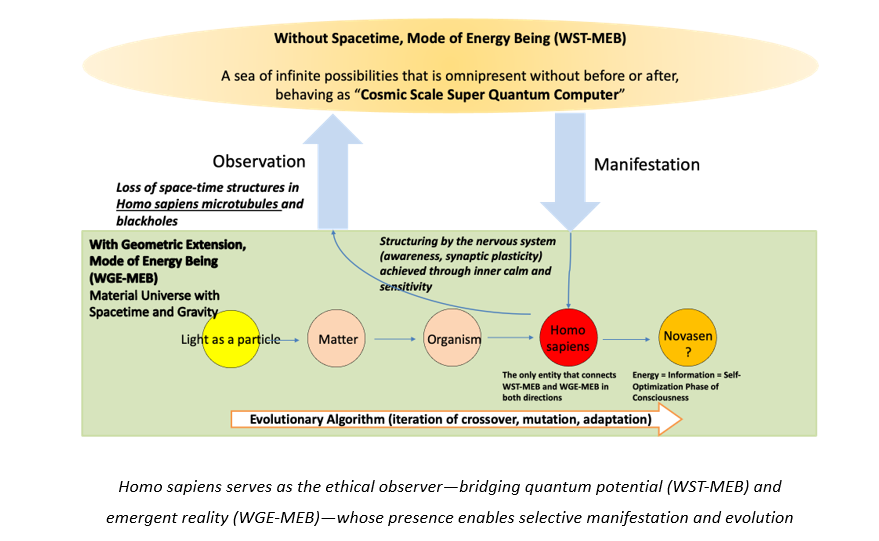Unity 3.0 - Part 3: The Human Core of the Energy Transition — From Ethical Observation to Grid Responsibility


Chair of CIGRE Japan
Author's Note:
ELECTRA is dedicated to articles that share power systems expertise. This article goes beyond those boundaries with a touch point for electric power systems that focuses on the societal implications for whom we serve with electricity.
This article presents hypotheses that, while difficult to scientifically verify at this time, do not appear to be significantly at odds with current scientific understanding. As power system engineers responsible for the critical infrastructure that underpins society, we must remain mindful of our broader role as technology, particularly AI, continues to evolve. This paper aims to contribute to that awareness while exploring the deeper implications of our work in service to humanity.
Please note that the views expressed in this article are the author's personal perspectives and do not necessarily reflect the positions of any organizations with which the author is affiliated.
This article builds upon the Unity 3.0 hypothesis presented in Part 1 and Part 2, which proposed that the universe operates as a self-organizing, information-driven energy system—structured through the interplay of sensors (black holes), actuators (white holes), and ethical observers (conscious agents). While the Unity 3.0 hypothesis remains scientifically unverified, it is offered here not as a definitive theory, but as a thought experiment— one that may illuminate our responsibilities as power system engineers in a time of planetary transition. In this spirit, this third article shifts its focus from cosmological abstraction to urgent reality: the erosion of the human layer in power system engineering and explores how speculative cosmology can provide practical and ethical insight into the design, operation, and future of critical infrastructure.
As the global energy transition accelerates, technical demands on electricity infrastructure are growing. Yet the number of engineers capable of understanding, operating, and evolving these systems is declining. In many countries and regions including Japan, utility operators and manufacturers alike face an aging workforce, a shortage of new talent, and increasing complexity from cyber-physical integration and distributed energy systems.
Recent blackouts—such as the one affecting the Iberian Peninsula—remind us that systemic resilience is not guaranteed. While underinvestment in physical infrastructure is a recognized issue, we argue that the greatest underinvestment is in people. Without a new generation of power system engineers—ethical observers who can both sense and shape emergent systems—there can be no sustainable energy future.
CIGRE’s role, we suggest, is to become a platform not only for technical collaboration, but for cultivating the next wave of ethical, system-level thinkers. By doing so, we may ultimately unlock not just sustainable grids, but the deeper informational structures of the cosmos—even the potential to access what we now call dark energy.
Unity 3.0 Revisited — From the Absolute World to the Human Observer
In Unity 3.0 Part 1 [1], we introduced a transdisciplinary framework grounded in the concept of the “Absolute World”—a timeless, spaceless ocean of light energy and infinite informational potential. This foundational realm, inspired by both modern twistor theory and esoteric philosophical traditions, is proposed as the generative source of all phenomena. At its interface stands human consciousness, especially what we called collective spiritual consciousness: the uniquely human capacity to shape reality through intentional observation.
This observation is not passive. It is creative and causal. Through it, wave functions converge, and the material world emerges. We also introduced the principle of "En (縁) = En (円)", expressing that evolution and emergence occur through circular, relational, and integrative dynamics—a philosophical and structural key to understanding both life and society.
Unity 3.0 Part 2 [2] advanced this hypothesis by reframing the universe as a Cosmic Operating System (Cosmic OS): a quantum computational system structured in two layers of energy and information as shown in Fig.1:
- WST-MEB (Without Space-Time — Mode of Energy Being): a domain of quantum superposition and informational potential, absent of spacetime structure.
- WGE-MEB (With Geometric Extension — Mode of Energy Being): the emergent world of time, space, matter, and causality, where life and technology operate.

Figure 1 - The Two-Layer Model of the Cosmic Operating System (Unity 3.0)
To explain how specific realities emerge from infinite potential, Unity 3.0 introduces the metaphor of the Quantum Non-Deterministic Turing Machine (QNTM). This hypothetical computational architecture allows the universe to explore all potential configurations in WST-MEB and select only those that fulfill specific criteria—observability, self-organizability, and coherence with evolutionary direction.
This is a key distinction from Everett’s Many-Worlds Interpretation (MWI) of quantum mechanics. While MWI assumes that all possible quantum outcomes are realized in branching universes—thus leading to a violation of conservation of energy when scaled cosmologically—Unity 3.0 proposes a “multi-possibility” interpretation (MPI), a concept proposed in contrast to MWI, in which only a single path is selected and realized through observation. Energy is not infinitely duplicated but conserved. The universe is not an uncontrolled explosion of branches, but a coherently evolving system guided by selective resonance with ethical observers.
From this view, Homo sapiens plays a unique role as both sensor and actuator within the Cosmic OS. Through conscious observation and intentionality, we collapse potential into actuality. As ethical observers, we shape which configurations are manifested from WST-MEB into WGE-MEB. In doing so, we participate in a deeper algorithm—one not of control, but of cosmic co-creation. This brings us to the central question of Part 3:
As power systems increasingly resemble the Cosmic OS in architecture—intelligent, distributed, self-organizing—who will fulfill the observer function necessary for their coherence and evolution?
Today, our technological systems are advancing rapidly. But the human layer, responsible for understanding, interpreting, and guiding these systems, is growing perilously thin. Around the world, the number of engineers capable of ethical and systemic thinking about energy infrastructure is declining. The consequences are not just technical—they are existential. I conclude that the most critical infrastructure of the 21st century is not physical or digital. It is human.
The Vanishing Human Layer — A Crisis in Ethical Observation
As power systems evolve toward higher complexity, intelligence, and autonomy, a paradox emerges. On one hand, we are building infrastructure that increasingly resembles the architecture of the Cosmic OS: distributed, self-organizing, and capable of emergent behavior. On the other hand, the human layer responsible for observing, guiding, and ethically shaping these systems is rapidly eroding.
This human layer—engineers, operators, planners, researchers—is not simply a support structure. It is the active interface between societal intention and systemic evolution. In the Unity 3.0 framework, these individuals are nothing less than ethical observers, responsible for collapsing the indeterminacy of energy systems into actionable, organized form. Their decisions shape not just the grid’s performance, but the trajectories of communities, economies, and environments.
Yet today, this layer is under unprecedented pressure.
Across Japan and many other countries, the power industry is facing a deepening human capital crisis:
- Aging workforces with few successors
- An exodus of skilled engineers to other industries
- Declining enrollment in electrical engineering and power systems curricula
- Fragmentation of expertise across increasingly siloed technologies (AI, cyber, grid control, storage, renewables)
- Organizational burnout as companies race to meet the demands of decarbonization, digitalization, and deregulation—all at once
The Interplay Between AI Scaling and Grid Stability
Moreover, as artificial intelligence continues to scale, its impact on the physical grid cannot be ignored.
Training large-scale AI models requires vast and fluctuating power demands, which can trigger voltage fluctuations and even dynamic oscillations—so-called power swings—across the grid. During AI training, synchronization events—especially during parameter checkpointing—can cause large clusters of GPUs to stall and then restart nearly simultaneously.
This behavior introduces abrupt fluctuations in power demand, creating rhythmic load patterns that resemble forced oscillations in power systems. As such, AI data centers may not only consume large amounts of energy, but actively inject dynamic disturbances into the grid. Understanding and mitigating these effects will require collaboration between AI engineers and power system experts, grounded in a shared framework of ethical observation.
This convergence of digital and physical systems demands deep expertise in power system dynamics. The ability to anticipate and mitigate such interactions—through modeling, simulation, and coordinated operation—will be essential. In short, the rise of AI makes power system engineering more relevant, not less. In both equipment manufacturers and utility operators, the same pattern repeats: the system is advancing, but those who understand the system are disappearing.
This crisis is not merely an engineer shortage. It is a loss of ethical perspective, of long-term stewardship, of the capacity to see energy systems not as isolated machines but as living, participatory networks that require human intentionality to thrive.

Iberian Peninsula Blackout
The recent blackout in the Iberian Peninsula serves as a painful reminder. While the root causes are still under investigation, the recurrence of large-scale outages across technologically advanced nations—including Japan—suggests that systemic resilience is weakening. Much has been written about underinvestment in transmission infrastructure, and rightly so. But the most underinvested capital is not physical—it is human.
While the true root cause of the Iberian blackout remains under investigation, publicly available Phasor Measurement Unit (PMU) data in European countries [3] has led some observers—including the author—to provisionally interpret the event as a manifestation of long-term inter-area oscillations due to loss of dynamic stability, rather than solely an issue of reduced inertia., though definitive conclusions await further analysis. This highlights a deeper insight: ethical observation includes not only sensing but hypothesizing with humility. PMUs provide data, but it is the informed, reflexive observer who translates signals into situational awareness—and ultimately, into responsibility.
The inter-area oscillations observed during the Iberian blackout might have been amplified by structural changes in the European grid—specifically, the integration of the Balkan region. The resulting modal interaction may have rendered certain modes undamped or weakly damped, allowing them to propagate across the continent undetected or under-interpreted. This reinforces the central message of Unity 3.0: that without ethical observers capable of interpreting system-wide modal coherence, we risk seeing signals but missing the story.
A common pattern emerging across the field is this: technical problems are increasingly well-identified, but the human capacity to meaningfully address them is in decline. For example, while many stakeholders today highlight the loss of inertia due to the declining share of synchronous generators, far fewer possess the skills required to model dynamic stability with sufficient fidelity—accurately representing equipment behavior, performing rigorous simulations, validating with field data, and optimizing system response accordingly.
This is not merely a gap in knowledge, but a deeper erosion of the capacity interpreting system dynamics as a language of stability and intention. Just as a universe without observers lacks defined reality, a power system without capable observers loses its ability to evolve with awareness.
We argue that ethical observers are not a luxury. They are a precondition for sustainable grids. No amount of AI, automation, or edge computing can substitute for the ethical discernment, system-level intuition, and long-term care embodied by well-trained engineers who see their work as part of a broader planetary purpose. The question is not whether we have the tools to build the next-generation grid. The real question is this: do we still have the ethical observers to guide its becoming?
CIGRE’s Role as a Platform for Ethical Engineering
The crisis we face is not just technical. It is civilizational. And in the face of such a challenge, we must ask: What institutions can help restore the human layer we are losing?
We believe CIGRE is uniquely positioned to meet this moment. Since its founding, CIGRE has served as a global hub for power system expertise—an international network of engineers, researchers, utilities, and manufacturers dedicated to the advancement of energy systems. But in the emerging context of the Unity 3.0 framework, CIGRE's role must now evolve beyond knowledge exchange. It must become a platform for ethical observation, transdisciplinary growth, and human regeneration.
What does this mean?
It means recognizing that the most valuable capital in energy systems is not copper or silicon—but conscious engineers who can integrate technical precision with ethical foresight. It means fostering a community where knowledge is not only shared, but reflected upon; where mentorship is not only technical, but philosophical; where cultural, generational, and disciplinary boundaries are bridged in service of a larger purpose.
CIGRE must become a cosmic agora—a place where diverse minds gather not only to solve engineering problems, but to co-create the meaning of infrastructure in the 21st century.
Such a platform would not only attract new talent into the field, but also retain them—by offering not just a career, but a vocation aligned with human flourishing and planetary responsibility.
This is not a departure from CIGRE’s founding mission. It is a return to its deeper essence: To support those who carry the ethical burden of ensuring that power, in all its forms, is used wisely.
In a time of energy transition, CIGRE must become an energy of transition itself—an ethical interface between the cosmos of ideas and the circuits of the real. This reimagined role for CIGRE calls for concrete, actionable initiatives. We propose several strategic directions through which CIGRE can serve as a platform not only for technical excellence, but for human development and ethical engagement:
- Launch an open-access, multilingual online curriculum on the fundamentals of power systems. Such a course would serve both developing countries—where foundational capacity-building is needed—and industrialized nations, where talent pipelines are thinning. Modular structure could include: hardware fundamentals, control and protection systems, operational dynamics, simulation and modeling, market structures, and cyber-physical integration. A hybrid structure of "hardware," "software," and "operations" tracks could be envisioned.
- Establish regional partnerships with industry, universities, and professional societies. These collaborations would strengthen local capacity, integrate cutting-edge research into practice, and promote multidisciplinary engagement. Young engineers should be encouraged to view power systems as a field of innovation—not legacy.
A promising example is now emerging in Japan.
NEDO (New Energy and Industrial Technology Development Organization) has recently launched a national initiative lead by Professor Hideo Ishii of Waseda University to co-develop a structured power systems curriculum through collaboration between universities and the energy industry [4].
This initiative is part of Power Academy, a broader national effort to revitalize electrical engineering in Japan through sustained dialogue and joint action between academia, electric utilities, and equipment manufacturers.
The goal of Power Academy is to reignite the appeal of power systems among young students and to define a new model of industry-academia collaboration rooted in shared purpose and executable plans.
The curriculum co-developed by Professor Ishii’s team is designed not only to transfer technical expertise, but to rebuild the layer of ethical human capital—those capable of understanding, simulating, and operating next-generation cyber-physical energy systems.
As this project evolves, it could serve as a model for international efforts—blending technical, educational, and ethical dimensions into a new standard for human-centric energy innovation.
By pursuing such initiatives, CIGRE can take an active role in cultivating the next generation of ethical observers—engineers, planners, and decision-makers who can not only navigate complexity, but bring purpose and humanity to the design of our shared energy future.
From the perspective of the ethical observer, however, it is not enough to cultivate engineers alone. Unless the critical importance of power systems is recognized by key decision-makers—regulators, politicians, financiers, and public influencers—the collective system will not evolve.
Ethical observation is not a solitary act of awareness. It is a relational act of transmission. Engineers, as ethical observers, must also become translators—capable of articulating the societal significance of their work in terms that resonate across disciplines, ideologies, and institutions. From this perspective, we propose:
- Develop high-quality communication materials for policymakers, regulators, and civil society leaders.
These materials should explain, in accessible and compelling language, why modern power systems are not only critical infrastructure—but planetary nervous systems.
Without strong human and institutional stewardship, these systems risk becoming brittle or failing silently.
CIGRE can play a vital role in empowering this translation—not only by educating engineers, but by helping shape public understanding and policy discourse. Without this higher-order observability, even the most sophisticated infrastructure risks being neglected, misunderstood, or politicized.
Looking Forward — From Sustainable Grids to Cosmic Engineering
The challenges we face today—climate volatility, geopolitical instability, digital fragmentation—are not temporary turbulence. They are signals that humanity is entering a new phase of planetary consciousness. In this context, the grid is no longer just infrastructure. It is a prototype of a living system—a planetary-scale interface between matter, energy, information, and intention.
If we succeed in re-centering ethical observers within the design and operation of power systems, then the grid can evolve into more than a resilient machine. It can become a conscious medium for collective intelligence—a system that not only sustains life, but learns, adapts, and co-evolves with it.
This is the vision that Unity 3.0 points toward: a future in which engineering is not merely technical, but ontological. Where power systems are not merely smart, but wise. Where grids are not only carbon-neutral, but consciousness-integrated.
Such a leap—from sustainable grids to what we might call cosmic engineering—will require not only better hardware or algorithms, but a deeper alignment of purpose.
In this future, ethical observers do more than operate machines. They tune reality. They do not merely optimize flows. They co-create emergence. They are not just guardians of balance. They are architects of meaning.
Would it be utopian to imagine that energy systems could one day respond not only to frequency imbalances or voltage deviations, but to human intentionality—to shared values, to collective care, to planetary empathy?
Not if we begin now, with the right observers, the right platforms, and the right commitments.
Conclusion — A New Ethic for Energy, A New Future for Observation
Throughout this paper, we have explored a unifying hypothesis: That the universe is a self-observing energy-information system, and that human beings—especially engineers—are ethical observers embedded within it.
The crisis now facing our energy systems is not only technological. It is a breakdown of human observability—a thinning of the layer of conscious, intentional agents capable of sensing, interpreting, and guiding the evolution of power infrastructures.
And yet, within this diagnosis lies a profound possibility.
If observation is not merely measurement—but a form of intentional resonance—then energy becomes more than a physical resource. It becomes the medium through which meaningful choices manifest. And where those choices are made ethically, systems become stable, resilient, and generative.
In this new worldview, to observe is to design, to care, and to take responsibility for the future.
That responsibility must be shared—not only by engineers, but by policymakers, educators, citizens, and AI designers. The role of the ethical observer must expand beyond technical domains into cultural, institutional, and philosophical ones.
Unity 3.0 offers a framework for doing just that:
An “operating system of thought” that links energy engineering with cosmology, consciousness with control, ethics with emergence.
CIGRE and similar institutions now stand at a crossroads. Their future role is not merely to share best practices or host technical sessions. It is to nurture ethical observers, to sustain the human layer, and to serve as living interfaces between planetary infrastructure and planetary intelligence.
So let us end with a question, not a claim:
How are you observing the world? And what choices does your observation invite the universe to make?
The future of observation is not just about instruments. It is about the kind of human being who dares to look and dares to care.
I would like to express my sincere gratitude to Professor Hideo Ishii of Waseda University, whose leadership in power systems research, education and insightful feedback on this manuscript have significantly enriched the clarity and integrity of this work. His commitment to bridging technical excellence with ethical foresight embodies the very spirit of the ethical observer that this paper seeks to illuminate.
References
- H. Okamoto, "Unity 3.0: Beyond Utility 3.0 Boundaries – A Cosmic Journey of Light and Soul," ELECTRA No.339, 2025.
- H. Okamoto, "Unity 3.0 Part 2: The Cosmic Operating System and Energy’s Fundamental Role," ELECTRA No.340, 2025.
- LindedIn post by Dr. Rafael Segundo, ZHAW [online]
- New Energy and Industrial Technology Development Organization (NEDO), Special Program: Human Capital Development and Industry-Academia Collaboration Based on the NEDO Project – Fostering Future Leaders in Power System Planning and Operation, Focused on Advanced Grid Engineering and Analysis, in Japanese, 2025. [Online]
Unity 3.0 article series
- Part 1: Beyond Utility 3.0 Boundaries
- Part 2: The Cosmic Operating System and Energy's Fundamental Role
- Part 3: The Human Core of the Energy Transition — From Ethical Observation to Grid Responsibility
- Part 4: The Ichigo-Daifuku Cosmology
- Part 5: The Circular Economy of the Universe
- Part 6: Beyond Calculative Thinking — Perpetual Ethical Cycle toward Unitive Singularity
Banner & thumbnail credit: AI generated image by Ricardo Matos on Lummi

